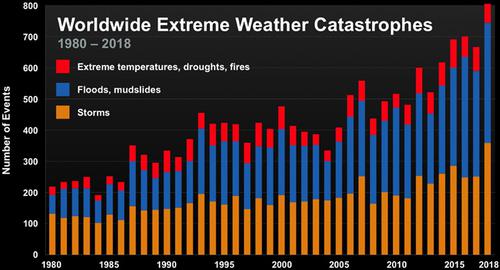当前位置:
X-MOL 学术
›
WIREs Energy Environ.
›
论文详情
Our official English website, www.x-mol.net, welcomes your
feedback! (Note: you will need to create a separate account there.)
Climate change: What we know and what is to be done
Wiley Interdisciplinary Reviews: Energy and Environment ( IF 5.4 ) Pub Date : 2020-10-18 , DOI: 10.1002/wene.388 Mark D. Levine 1 , Robert V. Steele 2
Wiley Interdisciplinary Reviews: Energy and Environment ( IF 5.4 ) Pub Date : 2020-10-18 , DOI: 10.1002/wene.388 Mark D. Levine 1 , Robert V. Steele 2
Affiliation

|
Our goal in this article is to explain briefly what we believe to be the scientifically confirmed findings of climate change and what actions in our judgment are needed to forestall the worst impacts of a changing climate. Climate change is well documented by data and scientific observation. The global average temperature has already increased by more than 1°C (1.8°F) above preindustrial levels, and the impacts already felt are significant and encompass the entire globe. A 1°C increase in global temperature has resulted in increased melting of glaciers and the Antarctic and Greenland ice sheets; higher frequency of more severe hurricanes; greater severity of droughts and forest fires; and extinction of selected species on land and in the sea, among other impacts. These are due largely to the extreme temperatures that accompany the higher mean temperature. There exist policies and cost‐effective technologies today that can achieve large reductions in carbon emissions. There is significant experience with all of the policies and technologies. R&D needs to be carried out on key new zero‐carbon technologies. Foremost among these technologies are electricity storage for large‐scale application in wind and solar power plants, batteries for electric vehicles, and zero‐carbon fuels for vehicles. Other than the (in our view limited but worthwhile) progress achieved through the Conference of the Parties meetings, especially the Paris Agreement, the world has not yet begun addressing climate change sufficiently to avoid very significant impacts. One early sign that the world has become serious about climate change will occur when oil and gas companies reduce and ultimately cease exploring for new resources.
中文翻译:

气候变化:我们所知道的以及将要做什么
本文的目的是简要解释我们认为是气候变化的科学证实结果,以及我们需要采取哪些行动来防止气候变化的最严重影响。数据和科学观察充分记录了气候变化。全球平均温度已经比工业化前的水平提高了超过1°C(1.8°F),并且已经感受到的影响是巨大的,并涉及整个地球。全球温度每升高1°C,冰川,南极和格陵兰冰盖的融化就会增加;更高频率的更严重的飓风;干旱和森林大火更加严重;以及选定物种在陆地和海洋中的灭绝以及其他影响。这些主要是由于较高的平均温度所伴随的极端温度。如今,存在可以大幅度减少碳排放量的政策和具有成本效益的技术。所有政策和技术都有丰富的经验。需要对关键的新零碳技术进行研发。这些技术中最重要的是用于风能和太阳能发电厂的大规模应用的电力存储,电动汽车的电池以及汽车的零碳燃料。除了通过缔约方大会各次会议(特别是《巴黎协定》)取得的(我们认为有限但值得的)进展外,世界尚未开始充分应对气候变化,避免产生重大影响。
更新日期:2020-12-10
中文翻译:

气候变化:我们所知道的以及将要做什么
本文的目的是简要解释我们认为是气候变化的科学证实结果,以及我们需要采取哪些行动来防止气候变化的最严重影响。数据和科学观察充分记录了气候变化。全球平均温度已经比工业化前的水平提高了超过1°C(1.8°F),并且已经感受到的影响是巨大的,并涉及整个地球。全球温度每升高1°C,冰川,南极和格陵兰冰盖的融化就会增加;更高频率的更严重的飓风;干旱和森林大火更加严重;以及选定物种在陆地和海洋中的灭绝以及其他影响。这些主要是由于较高的平均温度所伴随的极端温度。如今,存在可以大幅度减少碳排放量的政策和具有成本效益的技术。所有政策和技术都有丰富的经验。需要对关键的新零碳技术进行研发。这些技术中最重要的是用于风能和太阳能发电厂的大规模应用的电力存储,电动汽车的电池以及汽车的零碳燃料。除了通过缔约方大会各次会议(特别是《巴黎协定》)取得的(我们认为有限但值得的)进展外,世界尚未开始充分应对气候变化,避免产生重大影响。











































 京公网安备 11010802027423号
京公网安备 11010802027423号